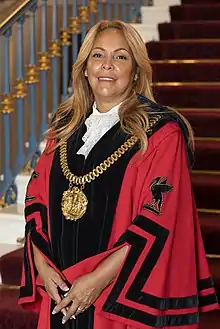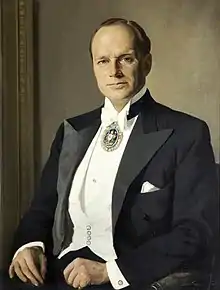Lord Mayor of Liverpool
The office of Lord Mayor of Liverpool has existed in one form or another since the foundation of Liverpool as a borough by the Royal Charter of King John in 1207, simply being referred to as the Mayor of Liverpool. The current Lord Mayor of Liverpool is the Right Worshipful Councillor Anna Rothery who has held the post since September 2019.
| Lord Mayor of Liverpool | |
|---|---|
 Councillor Anna Rothery since 2019 | |
| Liverpool City Council | |
| Member of | Liverpool City Council |
| Reports to | Mayor of Liverpool |
| Nominator | Political parties |
| Appointer | Electorate of Liverpool |
| Term length | One year |
History
The most prominent Mayors were the Stanleys of Knowsley, of which Sir Thomas Stanley (son of the 3rd Earl) and the 4th, 5th, 6th, 7th, 8th, 9th, 10th, 16th and 18th Earls of Derby have held this office since ancient times. The Molyneuxs of Sefton have also held this office on numerous occasions over the centuries: Sir Richard Molyneux, his grandson Sir Richard Molyneux Baronet, the 1st Viscount Molyneux and the 7th Earl of Sefton.
When Liverpool was granted city status in 1880 it was deemed necessary for the "second city of the Empire" to have a Lord Mayor. The city was granted a Lord Mayoralty on 3 August 1893 through letters patent making it the equal third oldest office of this kind in England along with Manchester. and Robert Durning Holt became the first Lord Mayor of Liverpool.[1]

For a substantial period of time the Lord Mayor of Liverpool used the prefix of "The Right Honourable" as did the Lord Mayor of London. Sir Albert Woods, Garter Principal King of Arms was of the opinion that this honorific should be enabled, due to the importance of Liverpool as a city second only to London. When Sir Alfred Scott-Gatty succeeded as King of Arms, he expressed the view that his predecessor had made an error. This changed nothing, however, and the city continued to use the prefix up until a Parliamentary statement in 1927. From then on the Lord Mayor was styled "The Right Worshipful".
William Wallace Currie was the first "Mayor of Liverpool" under the Municipal Corporations Act 1835.[2]
In 1983, the Labour controlled Council replaced the office of Lord Mayor with that of Chairman. The Lord Mayoralty was formally restored in 1990.[3]
The traditional office of the Lord Mayor of Liverpool differs from that of the new directly elected Mayor of Liverpool, an executive position created in 2012 when the functions of the former Lord Mayor were divided. The Lord Mayor's role is now primarily ceremonial in order to represent the city at civic functions and engagements, promote the city nationally and internationally and support local charities and community groups.
Mayors of the Borough of Liverpool (1207–1880)
|
|
|
Mayors of the City of Liverpool (1880–1892)
|
|
|
Lord Mayors of the City of Liverpool (1892–present)
|
|
|
References
- Annual report and bulletin of the Walker Art Gallery, Liverpool – Volumes 5–6 – Page 16 Walker Art Gallery – 1975 "He was the last Mayor and first Lord Mayor of Liverpool 1892-3. A son of George Holt (1790–1861), cotton broker, who founded the family fortunes"
- Gomer Williams History of the Liverpool – Privateers and Letters of Marque 2004 Page 572 "... Dr. James Currie, a native of Annandale, and father of William Wallace Currie, who became first Mayor of Liverpool, under the Municipal Corporations Bill."
- "List of Lord Mayors of Liverpool" (PDF). Retrieved 13 August 2016.
- "Election of Mayors". The Times (36922). London. 11 November 1902. p. 12.
- Re: 1956–7 John Sheehan see The Liverpool Echo Wednesday May 23rd 1956
- "Former Lord Mayor resigns from council and Labour Party over racist video scandal". Liverpool Echo. 2 August 2019. Retrieved 23 December 2019.
- "Liverpool lord mayor stripped of title after sharing racist video". The Guardian. Retrieved 30 July 2019.
- "Liverpool: First black mayor succeeds race row councillor". BBC News. 13 August 2019. Retrieved 23 December 2019.
- https://www.liverpoolecho.co.uk/news/liverpool-news/anna-rothery-reappointed-liverpool-lord-18384127
